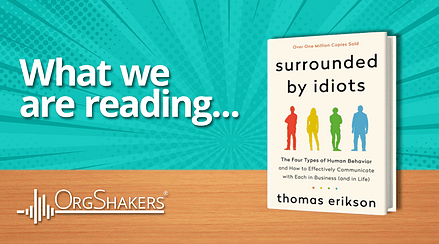Menu

How are Gen-Z Changing Leadership?
As the workplace continues to evolve post-pandemic, a notable shift is occurring in what defines effective leadership. Technical expertise and hard skills still matter, but they are no longer enough. Increasingly, success hinges on soft skills – empathy, adaptability, emotional intelligence and vulnerability. These “power skills” are becoming essential, particularly with Generation Z entering the workforce with fresh expectations around wellbeing, transparency and purpose.
Traditionally, hard skills were seen as more valuable, often because they appear more measurable and difficult to acquire. Yet, soft skills are far from simple. They are fluid, context-dependent and deeply human. They require constant development and self-awareness, and when applied well, they can dramatically reshape how teams function and how individuals lead.
A 2024 report from the McKinsey Global Institute predicts a 24 percent increase in the demand for social and emotional skills by 2030. Emotional competence, once considered optional, is now directly linked to better decision-making, higher employee engagement and improved team performance. Leaders who embrace these capabilities are better positioned to respond to the complex, people-centered challenges of today’s workplace.
Gen Z’s New Expectations
Generation Z is accelerating this shift. Having grown up with social media and digital transparency, Gen Z employees tend to value authenticity and purpose over hierarchy and titles. Deloitte’s 2025 Global Gen Z and Millennial Survey revealed that fewer than 6 percent of Gen Z workers prioritize leadership roles in the traditional sense. Instead, they seek environments that allow them to lead with meaning, maintain personal wellbeing and contribute to social good.
This generation is entering the workforce at a time when many traditional management structures are strained. Burnout among middle managers is widespread – 71 percent report feeling exhausted – raising valid concerns for younger workers about whether leadership is worth pursuing. Gen Z sees managers stuck between translating executive demands and supporting teams without adequate resources, recognition or authority. It’s no wonder they are skeptical of climbing the same ladder.
Yet, they are not rejecting leadership altogether. Gen Z is highly entrepreneurial. The 2023 Rose Review of Female Entrepreneurship reported a 24 percent increase in incorporated businesses founded by women aged 16 to 25 over a four-year period. Rather than chasing formal titles, Gen Z wants to lead on their own terms—autonomously, ethically and with impact.
Rethinking the Managerial Role
For HR professionals, this presents both a challenge and an opportunity. The traditional management model is not just uninspiring to Gen Z—it’s unsustainable for everyone. By redesigning what it means to manage, organizations can better align with modern values and improve performance across generations.
One of the most effective steps is to strip away administrative tasks that add little value. Auditing managerial responsibilities and automating where possible gives leaders the time and space to focus on people, not paperwork.
Providing genuine flexibility – beyond remote or hybrid setups – allows teams to create their own working rhythms, boosting both wellbeing and productivity.
Equally important is structured support. Research from the AllBright Future of Work report found that middle managers with strong peer networks report 40 percent less burnout. Building these networks creates psychological safety and reduces isolation, especially in roles with high emotional load.
Developing Soft Skills Proactively
Developing leadership capabilities should start well before someone is promoted. Emotional intelligence, setting boundaries, and navigating difficult conversations are not innate – they must be taught and practiced. The 2025 AllBright report also found that 56 percent of women want urgent development in leadership and management skills, viewing them as vital to career advancement.
Soft skills gaps are particularly pronounced in Gen Z. A 2024 study by the British Council revealed that 70 percent of employers perceive Gen Z graduates as lacking interpersonal and communication competencies. This finding is echoed globally: a recent scoping review of employer expectations found that communication, teamwork and adaptability are among the most sought-after but often underdeveloped skills in younger professionals.
Addressing these gaps doesn’t mean dismissing Gen Z as unprepared – it means offering them the structured mentorship and experiential learning they often missed during formative years impacted by the pandemic. Harvard research shows that mentorship can boost earnings and job readiness by as much as 15 percent for young adults.
Embedding Wellbeing and Purpose into Leadership
To attract and retain Gen Z talent, wellbeing must be built into leadership culture—not just offered as a perk. That includes setting measurable goals around manager wellbeing and rewarding those who model sustainable work habits. It also involves helping managers connect their work to a clear sense of purpose, which can make even routine tasks feel more meaningful.
Offering ‘leadership light’ roles—projects or teams that allow emerging leaders to gain experience without full accountability – can also provide low-risk entry points into management. These stepping-stone roles allow Gen Z to develop confidence and skills before taking on larger responsibilities.
Ethical and transformational leadership styles are especially effective. Research shows that when Gen Z sees leaders acting transparently, making values-driven decisions and involving teams in problem-solving, engagement and performance rise significantly. Trust, openness and shared purpose are not luxuries – they are prerequisites for modern leadership.
A Moment for Transformation
The growing emphasis on power skills is more than a generational trend—it’s a structural change in how leadership must function. As emotional intelligence and vulnerability move to the forefront, HR professionals are in a position to design leadership pathways that are not only more inclusive but also more effective.
By rethinking the role of the manager, developing soft skills early and embedding wellbeing into everyday practices, organizations can meet the needs of Gen Z and strengthen their workforce as a whole. The goal isn’t to make young people adapt to outdated models but to transform those models to unlock their creativity, passion and potential. In doing so, we create environments where every generation can thrive.



